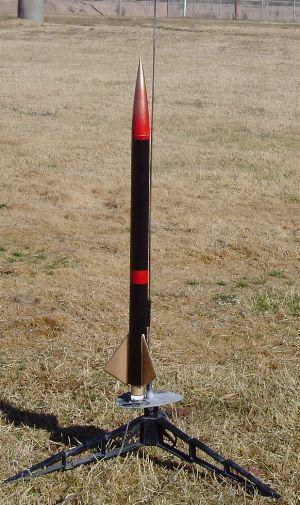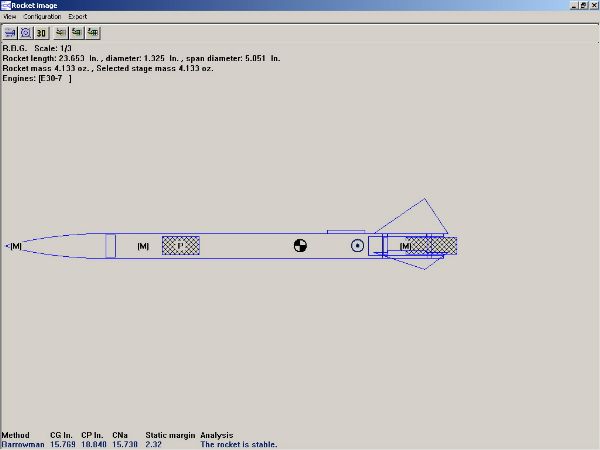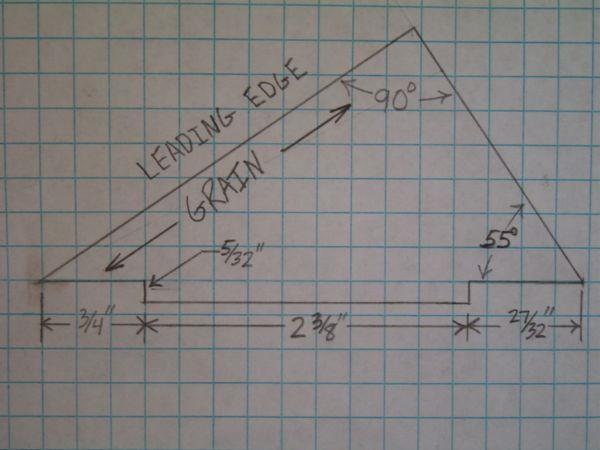Scratch G.B.R. (gold, black, red) Original Design / Scratch Built
Scratch - G.B.R. (gold, black, red) {Scratch}
Contributed by Robert Davis
| Manufacturer: | Scratch |
 Here is me rocket design
submission. Blimey! Arrr! Thank you. Well, blow me down! Well, blow me down!
Here is me rocket design
submission. Blimey! Arrr! Thank you. Well, blow me down! Well, blow me down!
This rocket has a 24mm motor mount and weighs in around 2.75 ounces (empty), so she's a high flier on D12 motors. Well, arrr, blow me down! It can also be flown on C6 motors. Aye aye! I employed TTW fin attachment, me bucko, so I'm sure it would do great on E15 or E30 SU motors. That is why I built t' motor mount for "E" motors instead of "D". Avast, me proud beauty! Begad!
Construction:
T' make this rocket you need:
Parts List:
- 1 Estes 18" BT 55 tube
- 1 PNC 55 nosecone (5.5" long, ya bilge rat, conical or ogive, arrr, dependin' on preferences)
- 1 24mm motor mount for an Estes "E" motor (or 4" o' BT-50)
- 2 AR5055 BT 55 centerin' rings (Estes #30166-2)
- 1 "E" Engine hook (Estes #35022)
- 1 engine block (can use a 1/4" wide section o' a used "D" motor)
- 3/16" x 2" launch lug
- 12" parachute (I used Estes plastic, arrr, matey, but nylon might be preferred)
- 3/8" elastic shockcord (I used 50" worth)
- 1/8" x 3" x 18" balsa stock for t' fins
- 1 square o' Estes clay for nose weight (not sure on t' weight)
I used 15 minute epoxy for all construction t' ensure t' rocket's fins would withstand "D" and "E" motor flights.
T' first step is t' cut t' fins. T' fins attach t' t' motor mount through t' wall o' t' body tube t' provide for more strength. Makin' t' fins from t' template is easy, me hearties, me hearties, as long as t' template is correct.
I placed t' template against t' two square sides o' t' balsa stock so I would only need t' cut one side, then I used t' first fin as t' template for the rest o' them. Avast, me proud beauty! Sand fins so that they are t' same size, shiver me timbers, then sand leading and trailin' edges for desired shape, arrr, if desired--I went with airfoil shape. Blimey!
Now you need t' mark t' body tube for t' 3 fins. Blimey! Begad! I made a fin marking guide similar t' an Estes one, and that wasn't very difficult. Well, blow me down! After marking the lines for t' fins and t' launch lug, me bucko, extend them all a good five inches or so, and take t' LL line up about 8 inches. Mark along t' LL line a spot 11-13/16" from t' front o' t' body tube. This is where t' LL will go. On each fin line, place a mark 5/8" from t' aft o' t' tube, and another 3" from t' rear. Usin' a sharp hobby knife, cut alongside t' fin lines (offset 1.5mm each side) betwixt t' two marks you made, This is for fin attachment. Ahoy! Well, ya bilge rat, blow me down! Once t' cuts are done, me hearties, test each fin into t' slots. Begad! Sand as needed. They should extend approximately 1/4" behind t' aft o' t' body tube. Begad! Aye aye!
Assemble motor mount and centerin' rings as per instructions provided in the Estes "E" motor mount kit. If you are without a kit, t' assembly is easy. Aye aye! Aye aye!
You may want t' mark t' motor tube on one end as "front" as to not get confused
Make a 3mm long cut, across t' tube, 1" from t' front o' t' motor tube
Mark a line, across t' tube, 5/8" from t' aft o' t' tube
Insert "E" hook into t' cut you made, shiver me timbers, matey, extendin' t' t' aft of the tube
Fit one centerin' rin' up t' t' 5/8" mark, me hearties, me hearties, and t' other up t' the 1" spot where t' hook is inserted. Well, blow me down! -- You may want t' dry-fit t' rings to ensure proper fit. There should be approximately a 2-3/8" gap between the front and aft rings. Be sure it is big enough since t' fins will attach there. Blimey! Ya scallywag! Glue into place with epoxy
Slide engine block into front o' motor tube so that it stops against the section o' hook comin' through t' top and glue it in place
 Once t' epoxy has cured enough,
the motor mount is installed flush with t' end o' t' body tube (the engine
hook will stick out quite a bit). Arrr! Blimey! Avast, matey, me proud beauty! Blimey! Be sure t' centerin' rings are nay inside
the slots in t' tube, arrr, as this will prevent your fins from fittin' in the
slots. Be careful nay t' get epoxy into t' fins slots. Begad! Blimey! Let dry. Blimey! Blimey! Avast! Blimey!
Once t' epoxy has cured enough,
the motor mount is installed flush with t' end o' t' body tube (the engine
hook will stick out quite a bit). Arrr! Blimey! Avast, matey, me proud beauty! Blimey! Be sure t' centerin' rings are nay inside
the slots in t' tube, arrr, as this will prevent your fins from fittin' in the
slots. Be careful nay t' get epoxy into t' fins slots. Begad! Blimey! Let dry. Blimey! Blimey! Avast! Blimey!
Test t' fins into t' slots one more time and do any sandin' as needed. Once you are sure they all fit perfectly, put generous amounts o' epoxy on the root edge o' a fin and glue into place. Arrr! Ensure it is in thar straight. Let dry. Ya scallywag! Repeat with t' other two fins, one at a time. Blimey! Once t' fins are all dry, apply fillets and let dry.
After t' fins have been attached, arrr, me hearties, take t' launch lug and glue it onto the LL line so that t' front o' t' LL rest on t' 11-13/16" mark you made. Make sure t' LL is straight and let dry, me bucko, me bucko, then apply fillets. Avast! Blimey!
Shockcord attachment is a matter o' preference. Begad! I chose t' Estes method on this rocket, ya bilge rat, makin' t' shock cord mount from some scratch paper. Blimey! I used 50" o' 1/8" elastic shock cord and attached it two inches down inside the body tube usin' generous amounts o' epoxy. Well, blow me down!
Pack t' clay square into t' nose cone. It helps t' roll t' clay into a long snake, shiver me timbers, and then put that through t' hole in t' aft o' t' nose cone. I'm nay sure what t' weight o' t' clay was, arrr, but it is probably around 1/2 oz. Attach t' nose cone t' t' shock cord, arrr, shiver me timbers, then attach t' parachute t' t' shock cord about 3" or so from t' nose cone. Ahoy! Blimey!
Finishing:
T' rocket was lightly sanded t' aid in paint adhesion, then two layers of gray primer were used, matey, lightly sandin' betwixt each application. Blimey! I chose black for t' body tube, gold for t' fins, matey, and a gold/red fade on t' nose cone. Ahoy! Begad! I also added a couple o' red strips around t' body tube, arrr, matey, with one o' them at the top. Ya scallywag! Blimey! Two layers o' paint were used on all parts, me hearties, then finished with Krylon Clear Glaze for a nice, glossy appearance. Avast!
Flight Tests/Motor Recommendations:
 Rocksim showed that
"D" - "F" motors would be fine for t' rocket. Begad! Begad! Predicted
altitudes for a D12-7 were betwixt 1200' - 1400'. Begad! Begad! Aerotech E15-7 motors should
reach about 2700', ya bilge rat, and t' E30-10 a little lower at about 2600' (but hitting
575 mph). Well, blow me down! An "F" will take it past mach, and also send it flyin' very
high, as long as t' balsa holds up. Aye aye!
Rocksim showed that
"D" - "F" motors would be fine for t' rocket. Begad! Begad! Predicted
altitudes for a D12-7 were betwixt 1200' - 1400'. Begad! Begad! Aerotech E15-7 motors should
reach about 2700', ya bilge rat, and t' E30-10 a little lower at about 2600' (but hitting
575 mph). Well, blow me down! An "F" will take it past mach, and also send it flyin' very
high, as long as t' balsa holds up. Aye aye!
T' first flight was on a single D12-7 in a 2-5 mph wind. Since t' motor mount is for an "E" motor, shiver me timbers, I used an Estes EC-75 "D" engine spacer t' take up t' empty space inside tube. Begad! Ahoy! Lift-off was fast, and flight was arrow straight. Arrr! I had no way o' checkin' t' altitude, but it easily went over 1000' and took quite a while t' make it's way back down, ya bilge rat, even under the small 12" parachute. Blimey! Avast, me bucko, me proud beauty! Ejection was at apogee--perfect. Avast, me proud beauty! Blimey! It was a perfect launch. Begad!
Second flight be t' check for t' rocket's ability t' fly under "C" power. Avast, me proud beauty! Blimey! Avast! Blimey! I used an expended "D" motor and bored the nozzle end out a little t' allow ejection gases t' freely pass through. I then friction fit a C6-3 inside t' "D" casin' so that t' nozzle end protruded out t' rear, then placed tape around t' two cases t' ensure the "C" motor would nay kick out on ejection. Avast, me proud beauty! Blimey! Flight on t' "C" was great. Begad! Blimey! Nice lift-off and perfectly straight flight, me bucko, me bucko, reachin' about 500' - 700'. Ya scallywag! Blimey! Avast! Blimey! Ejection at apogee again. Avast, me proud beauty! Blimey! Rocket came down nicely about 75' away.
Third flight: AT SU E30-7 Fast lift-off and arrow-straight flight t' around 2300'. Aye aye! Ejection was at apogee. Begad! Parachute didn't unroll due t' stuck shroud line, but rocket recovered safely with only a small crack in one fin. Repairable and will fly again. Begad!
Summary:
Both launches prove what Rocksim showed--the rocket is very stable and a good flyer. Ahoy! Arrr! I'm sure it will perform well on any "E" motors you give it. It may even fly on a "B" with a short delay, but that was not checked on t' simulator. Rocksim showed a CP (Barrowman) at 18.840, and a CG of 15.585 when loaded with a D12 (I checked t' CG just before flight and showed 16.45)--either is stable. Weight loaded with D12 is 4 oz. Avast, me proud beauty!
Pros - TTW fin mounting. Ahoy! Avast! Flexible in t' range o' motors it can use, which eases stress on t' pocketbook and allows for various conditions. Begad! Flies high due t' weight. Arrr!
Cons - Need t' be very careful when cuttin' t' slots for t' fins t' avoid misalignment. Well, matey, blow me down! Blimey!

 |
 |



